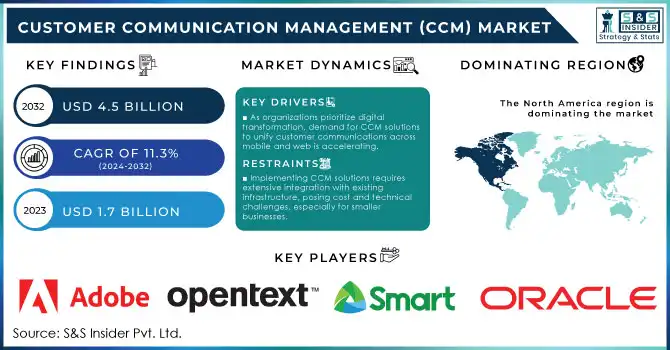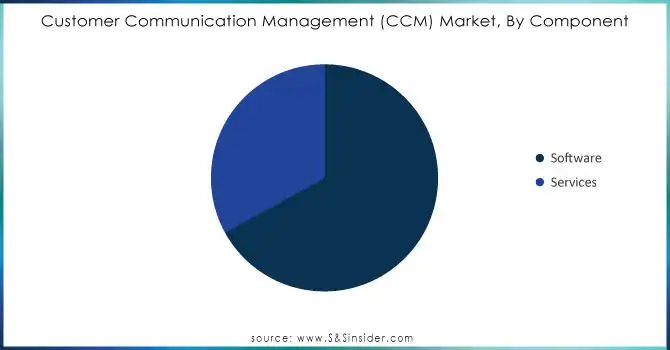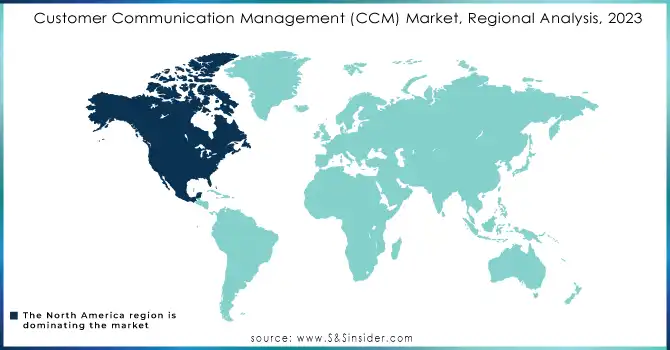Customer Communication Management (CCM) Market Size & Overview:

To Get More Information on Customer Communication Management Market - Request Sample Report
The Customer Communication Management (CCM) Market was valued at USD 1.7 billion in 2023 and is expected to reach USD 4.5 billion by 2032 while growing at a CAGR of 11.3% over the forecast period of 2024-2032.
Growing demand for effective customer engagement & digital transformation is driving the customer communication management market strongly across sectors. Government initiatives focused on enhancing the quality of service provided to customers (especially in regulated industries) have also helped in the growth of CCM solutions. As per the latest government figures, customer service digitalization is up 25 percent year-on-year in healthcare, BFSI (Banking, Financial Services, and Insurance), and public sectors. According to the latest survey conducted by a government body dealing with digital transformation in public services, approximately 60% of federal and state agencies are predicted to adopt CCM solutions by the end of 2025. Also, regulatory authorities have led organizations to invest in CCM tools that enable secure, omnichannel communication with customers. A focus on compliant architecture meets the needs of data privacy laws, such as the GDPR in the EU and CCPA in the U.S., that require secure and transparent data handling practices, thus bolstering the adoption of CCM.
The increasing demand for omni-channel communication is contributing to the growth of the market, as companies strive to give same-messaging communication across different channels such as email, SMS, and social media. As these are the platforms people prefer, organizations need to provide timely, relevant documents and promotions through them to sustain good customer relationships. Key drivers include changing customer expectations for seamless, multi-channel experiences, the ability to personalize communication for better engagement and the operational efficiencies and cost savings achieved by streamlining processes across channels.
The Customer Communication Management Market Dynamics
Drivers
-
As more organizations prioritize digital transformation, there’s an accelerated push to adopt CCM solutions for consistent and integrated customer communications across digital channels like mobile and web platforms.
-
Modern customers expect tailored interactions. Advanced CCM systems leverage data analytics and AI to create more personalized, relevant experiences, enhancing customer satisfaction and engagement.
The transition to digital engagement is the major driving factor drive the Customer Communication Management Market due to increased consumer expectations for a seamless, personalized, and digital experience. With digital communication channels such as email, SMS, web portals, and mobile apps widely integrated into customer interaction strategies, there is also a growing trend among organizations that auto-deploy CCM solutions deploying solutions that provide a centralized view to deliver across these channels. As an example, Smart Communications' study reveals that almost 80% of customers anticipate personalized engagement, pushing organizations toward a digital-first strategy that supports real-time interactive engagement. This change is particularly pertinent as younger, online native generations constitute a growing share of the customer base according to the study. About 72% of companies plan to invest in digital transformation to improve customer engagement in 2023 itself making it one of the major use cases for deployment of CCM platforms that automate and personalize customer interactions across touchpoints.
CCM is mainly used to improve the customer experience in industries like banking, insurance, and telecommunications. For example, banks employ CCM tools to deliver timely and relevant notifications such as account updates and financial advice via customer-preferred channels such as mobile applications. In addition, insurers are utilizing the capabilities of CCM to facilitate communications around claims processing, leading to faster, seamless interactions between customers and agents on both sides, while eliminating downtime. This increasing dependence on the digital channel signifies the requirement of flexible omnichannel communication-centric CCM platforms enabling an effective omnichannel communication strategy and giving organizations a reliable avenue to cater to the rising customer demands for digital interactions.
Restraints:
-
Implementing CCM solutions often requires extensive integration with existing infrastructure, which can be costly and technically challenging for businesses, especially smaller enterprises.
-
With stringent data protection regulations like GDPR, businesses must ensure that their CCM systems comply with data privacy laws, posing a challenge to maintaining security and regulatory compliance.
The integration of CCM solutions with existing infrastructure tends to be complicated and costly, which is one of the major restraints for the customer communication management market. A lot of companies were built with various in-house systems, all designed for different jobs which of course are not compatible with any modern CCM platform. Integrating these systems requires not only technical expertise but also substantial financial resources, as it often involves custom coding, process re-engineering, and additional support staff. For this category of enterprise, this may be exceedingly difficult, as they ought not to have the resources to make those investments. Integrating with such systems takes time, and would create a temporary disruption in operations while transition is ongoing. Of course, these complexities have left businesses wary of turning to advanced CCM tools, despite seeing the value. This translates into high integration costs and operational risks, which in turn can create adoption inertia with CCM technologies, predominantly in organizations with limited resources.
The Customer Communication Management Market Segment analysis
By component
The software segment dominated the market with a 67% revenue share, In 2023. This is because CCM software has a wide range of capabilities, such as automating personalized messages, engaging in real-time, and integrating with other enterprise software. Many governments and enterprises addressed the capability of CCM software to manage data securely, track compliance, and integrate with AI tools for predictive analytics. Recent governmental digital transformation guidelines have pushed toward software-based solutions for customer engagement and projected a 35% increase in digital platform investments up until 2025. As a result, software adoption has skyrocketed even in highly regulated industries, where compliance and data security is the number one priority.

Do You Need any Customization Research on Customer Communication Management Market - Enquire Now
By Enterprise Type
In 2023, the large enterprises segment dominated the CCM market was captured a 71% revenue share. Since large enterprises have a huge client base and their operations are quite complicated, they need more advanced communication management solutions. A 2023 government report suggests that enterprises spend much on customer experience technologies and 80% of those surveyed are looking to broaden their CCM capacities in three years. Regulatory compliance is also a consideration because more extensive organizations must comply with strict regulations that require high levels of communication infrastructure. The trend of pursuing investment in Centralised Communications Management (CCM) systems has become a priority for large corporations as state statistics show large enterprises are 50% more likely to undergo government regulation audits concerning communication with customers as compared to SMEs.
By Industry
The Banking, Financial Services, and Insurance (BFSI) sector accounted for the largest share of the CCM market in 2023, at 26%. The BFSI segment is anticipated to hold the largest market share owing to the high regulatory requirements related to the BFSI industry and also, customer communication is a key element of financial transactions and insurance services. In a 2023 report, the government pointed out that the financial institutions had upped their expenditure by 30% on digital media driven by technicalities which entails that a clean and transparent channel of communication secured by regulatory systems is essential. Besides, CCM delivery is proving to be a boon for financial transactions that need instant and clear communications because of growing regulations in the BFSI industry.
The Customer Communication Management Market Regional Analysis
North America led the global Customer Communication Management Market in 2023 due to large investments in digital transformation and high adoption of customer experience technologies across sectors. The strong market share of the region is emerging due to the presence of key technology providers along with a favorable and supportive regulatory landscape, which focuses on data security and creating a digital community for people. According to U.S. government statistics, more than 75% of organizations implemented CCM solutions aimed to result from government-funded incentives and grants intended to drive digital transformation within healthcare, financial services, and government agencies. Moreover, the recent policy developments that focus on providing secure yet efficient customer interactions have furthered the drive for the CCM market.
On the other hand, the Asia-Pacific region is projected to increase at the fastest CAGR throughout the forecast period. Enterprises in the region are quickly adopting CCM to cater to incoming digital communication demand with government-backed initiatives such as Digital India, Smart Cities Mission, and the Digital New Deal of South Korea. This growth is expected as the region experiences higher smartphone penetration and scaling in internet infrastructure. Demand for CCM solutions continues to grow as companies are highly focused on reaching and retaining customers through effective, localized communication channels, as well as through the development of digital business models and secure communication practices driven by government programs in BFSI, retail, and public sectors.

Recent Developments in the The Customer Communication Management Market
-
In June 2023, Quadient partnered with Plexus Tech, creating an opportunity for Plexus Tech customers to take advantage of Quadient Inspire's centralized communications design and management platform.
-
Doxim was selected by TradeStation Securities in May 2023 to deliver a CCM solution that would streamline the generation, tracking, and distribution of client account statements, digitally and physically, to drive operational efficiency.
Key Players
Key Service Providers/Manufacturers:
-
Adobe Systems Inc. (Adobe Experience Manager, Adobe Campaign)
-
OpenText Corporation (OpenText Exstream, OpenText Communications Center)
-
Smart Communications (SmartCOMM, SmartIQ)
-
Quadient (Inspire Suite, Inspire Evolve)
-
Oracle Corporation (Oracle CX, Oracle Eloqua)
-
Pitney Bowes Inc. (EngageOne, SendPro)
-
HP Inc. (HP Exstream, HP Output Management)
-
Neopost SA (Neotouch, OMS-500)
-
Xerox Corporation (XMPie, DocuShare)
-
Microsoft Corporation (Microsoft Dynamics 365 Customer Insights, Microsoft Power Platform)
Users of CCM Solutions
-
American Express
-
Wells Fargo
-
CitiGroup
-
Humana Inc.
-
State Farm Insurance
-
Aetna Inc.
-
AT&T Inc.
-
Verizon Communications Inc.
-
UnitedHealth Group
-
Bank of America
| Report Attributes | Details |
| Market Size in 2023 | US$ 1.7 Bn |
| Market Size by 2032 | US$ 4.5 Bn |
| CAGR | CAGR of 11.3% from 2024 to 2032 |
| Base Year | 2023 |
| Forecast Period | 2024-2032 |
| Historical Data | 2020-2022 |
| Report Scope & Coverage | Market Size, Segments Analysis, Competitive Landscape, Regional Analysis, DROC & SWOT Analysis, Forecast Outlook |
| Key Segments | • By Component (Software, Services) • By Deployment (On-premises, Cloud) • By Enterprise Type (Large Enterprises, SMEs) • By Channel (SMS, Email, Website, Social Media, Others) • By Industry (BFSI, Retail, IT & Telecom, Government, Healthcare, Others) |
| Regional Analysis/Coverage | North America (US, Canada, Mexico), Europe (Eastern Europe [Poland, Romania, Hungary, Turkey, Rest of Eastern Europe] Western Europe] Germany, France, UK, Italy, Spain, Netherlands, Switzerland, Austria, Rest of Western Europe]), Asia Pacific (China, India, Japan, South Korea, Vietnam, Singapore, Australia, Rest of Asia Pacific), Middle East & Africa (Middle East [UAE, Egypt, Saudi Arabia, Qatar, Rest of Middle East], Africa [Nigeria, South Africa, Rest of Africa], Latin America (Brazil, Argentina, Colombia, Rest of Latin America) |
| Company Profiles | Adobe Systems, OpenText Corporation, Smart Communications, Quadient, Oracle Corporation, Pitney Bowes, HP Inc, Neopost SA, Xerox Corporation, Microsoft Corporation |
| Key Drivers | • As more organizations prioritize digital transformation, there’s an accelerated push to adopt CCM solutions for consistent and integrated customer communications across digital channels like mobile and web platforms. • Modern customers expect tailored interactions. Advanced CCM systems leverage data analytics and AI to create more personalized, relevant experiences, enhancing customer satisfaction and engagement. |
| Market Restraints | • Implementing CCM solutions often requires extensive integration with existing infrastructure, which can be costly and technically challenging for businesses, especially smaller enterprises. • With stringent data protection regulations like GDPR, businesses must ensure that their CCM systems comply with data privacy laws, posing a challenge to maintaining security and regulatory compliance. |

